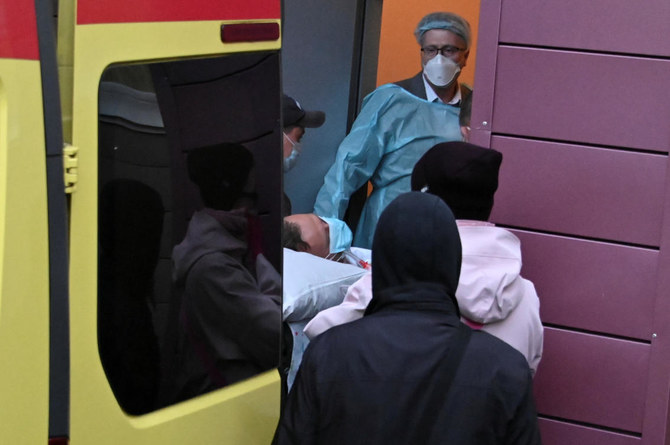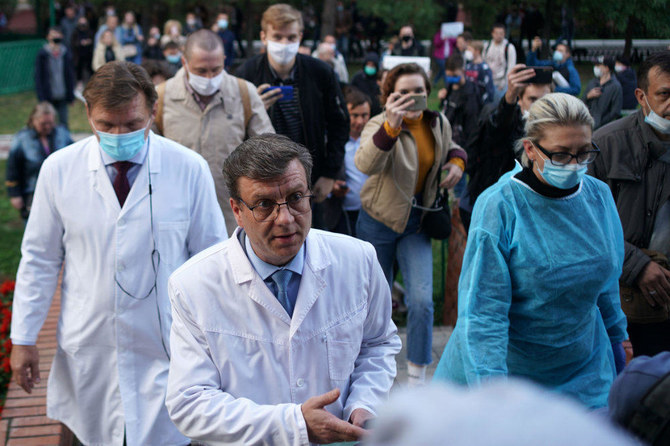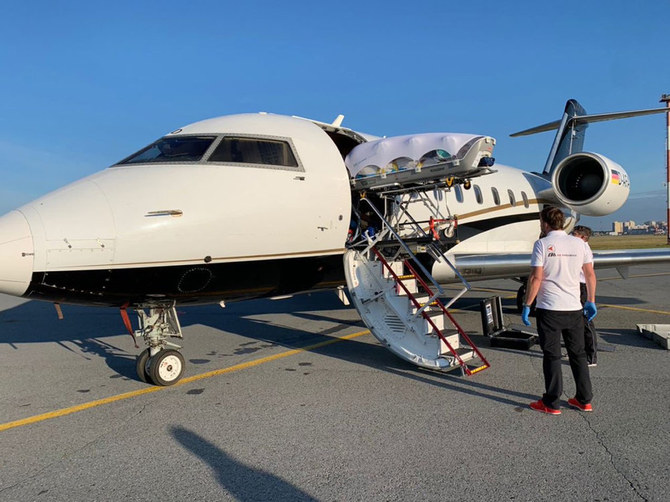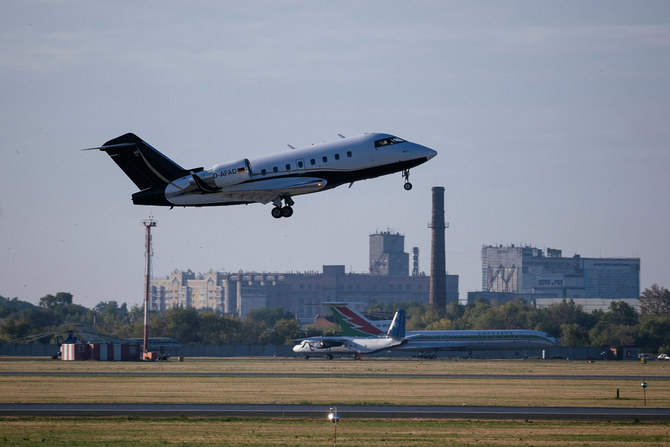MOSCOW: A plane carrying a Russian dissident who is in a coma after a suspected poisoning left for a German hospital Saturday following much wrangling over Alexei Navalny’s condition and treatment.
The plane could be seen taking off from an airport in the Siberian city of Omsk just after 8 a.m. local time.
Navalny, a 44-year-old politician and corruption investigator who is one of Russian President Vladimir Putin’s fiercest critics, was admitted to an intensive care unit in Omsk on Thursday. His supporters believe that tea he drank was laced with poison — and that the Kremlin is behind both his illness and the delay in transferring him to a top German hospital.
When German specialists first arrived on a plane equipped with advanced medical equipment Friday morning at his family’s behest, Navalny’s physicians in Omsk said he was too unstable to move.
Navalny’s supporters denounced that as a ploy by authorities to stall until any poison in his system would no longer be traceable. The Omsk medical team relented only after a charity that had organized the medevac plane revealed that the German doctors examined the politician and said he was fit to be transported.
Deputy chief doctor of the Omsk hospital Anatoly Kalinichenko then told reporters that Navalny’s condition had stabilized and that physicians “didn’t mind” transferring the politician, given that his relatives were willing “to take on the risks.”
The Kremlin denied resistance to the transfer was political, with spokesman Dmitry Peskov saying that it was purely a medical decision. However, the reversal came as international pressure on Russia’s leadership mounted.

Alexei Navalny delivers a speech in Moscow on Sept. 29, 2019, during a rally to demand the release of opposition members jailed during a demonstrations for fair elections. (REUTERS file photo)
It would not be the first time a prominent, outspoken Russian was targeted in such a way — or the first time the Kremlin was accused of being behind it.
On Thursday, leaders of France and Germany said the two countries were ready to offer Navalny and his family any and all assistance and insisted on an investigation into what happened. On Friday, European Union spokeswoman Nabila Massrali added that the bloc was urging Russian authorities to allow him to be taken abroad.
Also on Friday, the European Court of Human Rights said it was considering a request from Navalny’s supporters that it urge the Russian government to let the politician be moved.
The most prominent member of Russia’s opposition, Navalny campaigned to challenge Putin in the 2018 presidential election but was barred from running. Since then, he has been promoting opposition candidates in regional elections, challenging members of the ruling party, United Russia.
His Foundation for Fighting Corruption has been exposing graft among government officials, including some at the highest level. But he had to shut the foundation last month after a financially devastating lawsuit from a businessman with close ties to the Kremlin.
Navalny fell ill on a flight back to Moscow from Siberia on Thursday and was taken to the hospital after the plane made an emergency landing. His team made arrangements to transfer him to Charité, a clinic in Berlin that has a history of treating famous foreign leaders and dissidents.
Dr. Yaroslav Ashikhmin, Navalny’s physician in Moscow, told The Associated Press that being on a plane with specialized equipment, including a ventilator and a machine that can do the work of the heart and lungs, “can be even safer than staying in a hospital in Omsk.”
Navalny’s spokesperson, Kira Yarmysh, posted pictures of what she said was a bathroom inside the hospital that showed squalid conditions, including walls with paint peeling off, rusting pipes, and a dirty floor and walls.
While his supporters and family members continue to insist that Navalny was poisoned, doctors in Omsk denied that and put forth another theory.

In this file photo taken on July 10, 2013, Russian police officers detain opposition leader Alexei Navalny in Moscow. (AP Photo/Evgeny Feldman, File)
The hospital’s chief doctor, Alexander Murakhovsky, said in a video published by Omsk news outlet NGS55 that a metabolic disorder was the most likely diagnosis and that a drop in blood sugar may have caused Navalny to lose consciousness.
Another doctor with ties to the politician, Dr. Anastasia Vasilyeva, said that diagnosing Navalny with a “metabolic disorder” says nothing about what may have caused it — and it could have been the result of a poisoning.
Ashikhmin, who’s been Navalny’s doctor since 2013, said the politician has always been in good health, regularly went for medical checkups and didn’t have any underlying illnesses that could have triggered his condition.
Western toxicology experts expressed doubts that a poisoning could have been ruled out so quickly.
“It takes a while to rule things out. And particularly if something is highly toxic — it will be there in very low concentrations, and many screening tests would just not pick that substance up,” said Alastair Hay, an emeritus professor and toxicology expert from the school of medicine at the University of Leeds.
Like many other opposition politicians in Russia, Navalny has been frequently detained by law enforcement and harassed by pro-Kremlin groups. In 2017, he was attacked by several men who threw antiseptic in his face, damaging an eye.
Last year, Navalny was rushed to a hospital from jail — where he was serving a sentence on charges of violating protest regulations. His team also suspected poisoning then. Doctors said he had a severe allergic attack and sent him back to detention the following day.
The widow of Alexander Litvinenko, the former Russian agent who died in London in 2006 after drinking drinking tea laced with radioactive polonium-210, said she understood why Navalny’s family wanted him transferred abroad.
Marina Litvinenko told the AP via a video call from Italy that “every day, every hour, sometimes every second” is important.
She expressed her support for Navalny’s family, saying: “Particularly for his wife Yulia, be strong,” she said. “And never give up. Believe he will survive.”
































